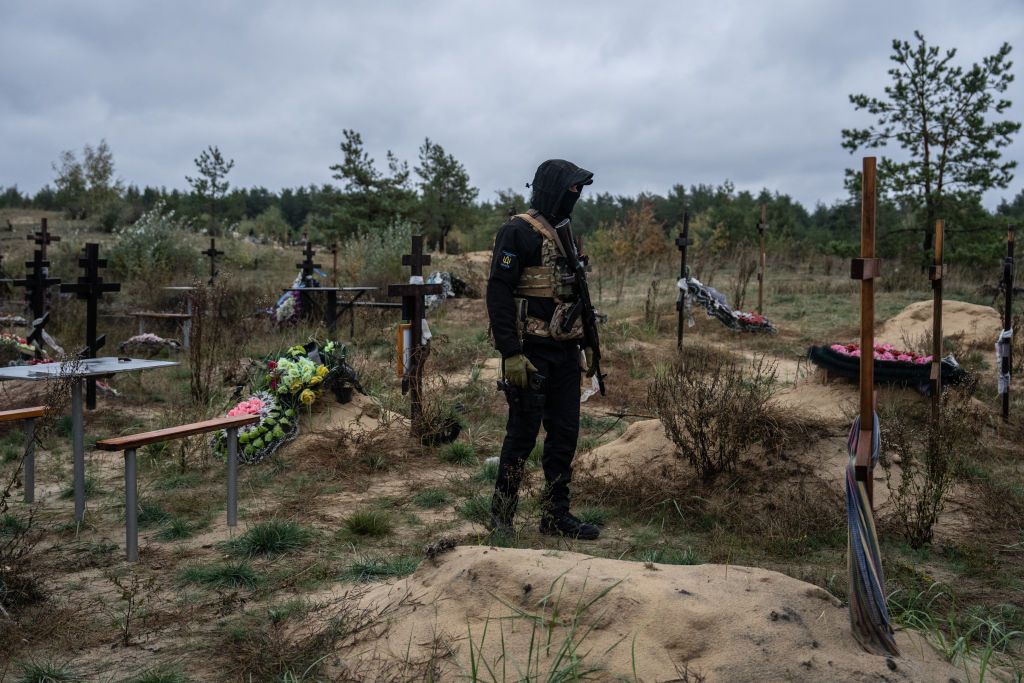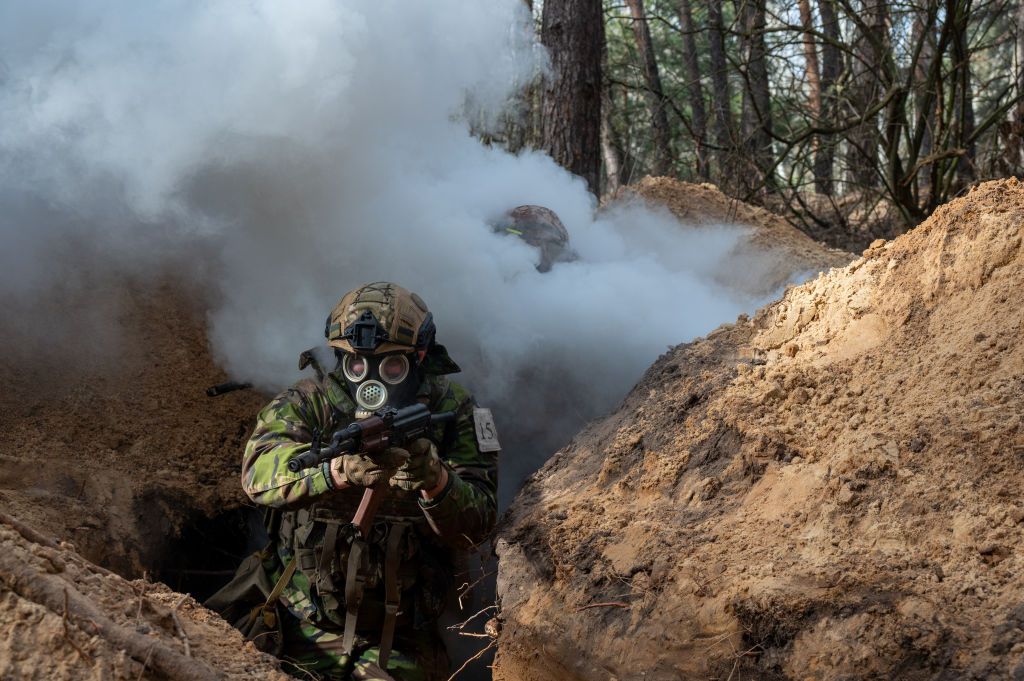Opinion: Troops in Ukraine? France-Germany spat plays into Putin's hands

French army personnel step out of a plane at the Mihail Kogqlniceanu air base near Constanta, Romania, on March 3, 2022, a week after the start of Russia's full-scale invasion of Ukraine. (Daniel Mihailescu/AFP via Getty Images)

Roland Freudenstein
Director of the Free Russia Foundation's Brussels Office
Whoever doubts that Europe is in danger of an ominous divergence on Russia and Ukraine should take a look at the forced smiles of the “triple handshake” between German Chancellor Olaf Scholz, French President Emmanuel Macron, and Polish Prime Minister Donald Tusk when they met in Berlin last Friday, ostensibly to overcome their strategic differences in the context of the “Weimar Triangle.”
In the past three weeks, Europe’s debate about increased support for Ukraine versus “suing for peace” has gone up several decibels in volume. Let’s take a closer look at France, Germany, and Poland’s leaders and ask whether the glass is half full or half empty and whether these leaders can yet take a strategic step forward in supporting Ukraine.
Macron’s trajectory
The most remarkable development over the past 10 months has been the pivot of Macron’s position on the war. Macron, before and even during Russia’s full-scale invasion of Ukraine, was one of the most outspoken believers in dialogue with Russian President Vladimir Putin. Even in the summer of 2022, he still talked about “legitimate” Russian security interests, a new European security architecture, and “not humiliating Russia.” This has radically changed.
Macron first began to embrace the more hawkish Central European EU and NATO member states at the end of May 2023 with his Bratislava speech. Pundits agree that this was due to a realistic recognition that France alone cannot dominate European security. Nor can France and Germany together do this – especially in a situation where NATO may be severely weakened by a Trump victory in the U.S. election and where German and French strategic cultures are extremely different.
Macron, of course, has not given up the idea of French leadership, but now he believes that he needs the Eastern flank countries, also for the simple reason that they were proven right in their perception of the Russian threat. And this is the second factor that explains especially the more recent phase in France’s trajectory: Putin himself.
The Kremlin’s relentless escalation of the war – and of oppression at home – has convinced Macron that peace with Russia under Putin is impossible and that Ukraine has to win.
But the failed Ukrainian counteroffensive, Russia’s slow but steady advance in eastern Ukraine, and the precarious dwindling of supplies from the U.S. have raised alarm bells in Paris. Macron has understood that a military defeat of Ukraine would be disastrous for Europe and freedom in general.
France now also officially supports Ukraine’s European Union and NATO membership. Most significantly, he repeatedly emphasized that sending NATO troops to Ukraine should not be ruled out. For this last statement, he earned frenetic applause from the EU’s Eastern flank but pretty hard criticism from Germany and French citizens themselves. But that doesn’t change the fact that his insistence on strategic ambiguity as the only way to deter bullies like Putin is absolutely correct.

The end of Scholz’s ‘Zeitenwende?’
Scholz in Germany, on the other hand, has zig-zagged since his “Zeitenwende” (historic turning point) speech in February 2022. When it comes to military deliveries to Ukraine, Germany has consistently improved – but dragged its feet over high-quality weapon systems such as modern air defense systems, infantry fighting vehicles, main battle tanks, and missile artillery. These weapons were mostly delivered eventually, but “too little, too late.”
While the two junior coalition partners in Berlin, the Greens and Liberals, together with the opposition Christian Democrats, usually pushed for sending more sophisticated weapons, the Chancellor and Germany’s Social Democratic Party (SPD) followed a pattern of first opposing, then grudgingly approving deliveries, but usually in small quantities.
The Chancellor’s Office flagged the arch-German virtue of “Besonnenheit” (level-headedness), but in reality, they were driven by the fear that Putin might escalate the war, maybe even singling out Germany as a result of a too abrupt improvement of German deliveries.
That is allegedly also the reason for Scholz’s refusal to clearly state that Russia has to lose and Ukraine has to win this war. With the powerful Taurus cruise missile, things got stuck, and Scholz is now so committed to non-delivery that it will be extremely difficult to climb down from this position. While Scholz’s coalition in Berlin is beset by internal rifts and embattled in the polls, in the question of Ukraine policy, his “level-headed” approach seems to be popular.
The SPD is at the lowest point of its popular support in its long history and fears massive losses in the upcoming European Parliament elections and three regional ones in the eastern states. That is why the SPD’s spin doctors have come up with the strategy of casting Scholz in the role of the “Peace Chancellor” (with historical echoes of Willy Brandt), trying to reverse the downward trend in the polls.
This is also why Scholz so vehemently sticks to the non-delivery of Taurus and rejects Macron’s talk of NATO boots on the ground in Ukraine, and why SPD leaders now speak of “freezing the conflict” – de facto only encouraging Putin to be bolder in escalating the war and repeating his nuclear and hybrid threats against the West.
The disturbing truth is that since its promising shift toward Western resilience and support for Ukraine during 2022 and 2023 (despite the zig-zagging), Germany has never been as close to a U-turn from the “Zeitenwende” as in the spring of 2024.
With a little help from our friends
In this situation, hope rests on Germany’s friends and allies – East as well as West. The Weimar meeting last week was a good start. The Weimar Triangle will be a good driver of more sustainability in European defense and defense production. Donald Tusk, whose credentials in militarily supporting Ukraine while strengthening his own country’s defense are beyond doubt, can join Macron in talking sense into Scholz.
Other Eastern flank countries, as well as the Nordic states, should reinforce their messaging. Much will also depend on more clarity from Washington, where U.S. President Joe Biden’s strategic advisors have, time and again, given Scholz the opportunity to claim that he may be facing headwinds among Eastern neighbors but that he is marching in lockstep with the Americans.
An isolated Scholz will not be successful in presenting himself as the “Peace Chancellor” to German voters. In that sense, the glass is half empty, and the situation is dramatic, but a real split in Europe on war and peace in Ukraine can still be prevented.
Editor’s Note: The opinions expressed in the op-ed section are those of the authors and do not purport to reflect the views of the Kyiv Independent.












